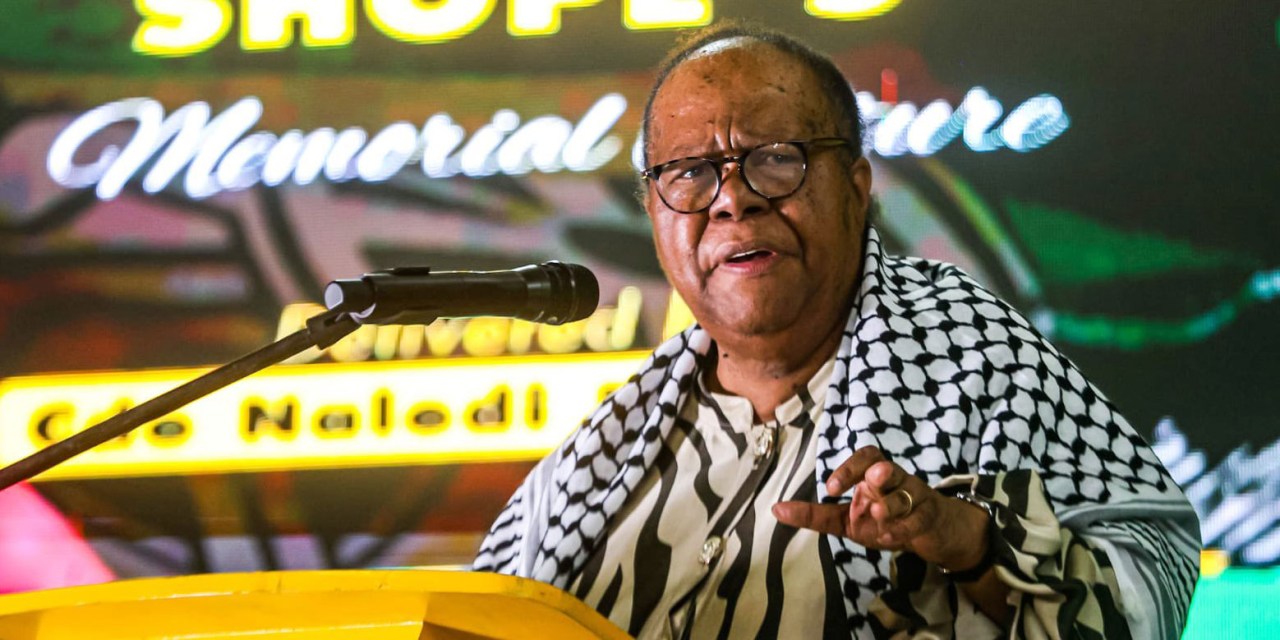
Naledi Pandor addressing the audience during the Gertrude Shope Memorial Lecture.
(The Post News)– African National Congress (ANC) veteran Naledi Pandor urges leaders to take responsibility and avoid shifting problems to others, stressing that the ANC must lead by example and uphold accountable leadership for South Africa’s future.
Furthermore, Pandor articulated her position after President Cyril Ramaphosa asked a question at the national dialogue convention concerning the widespread poverty many South Africans experience.
She argued that asking rhetorical questions cannot replace decisive action. According to Pandor, citizens expect the ANC to provide solutions and not delay progress through endless discussion. According to her, citizens expect the ANC to provide solutions and not delay progress through endless discussion.
Pandor Urges Local Accountability
Furthermore, Pandor articulated her position after President Cyril Ramaphosa asked a question at the national dialogue convention concerning the widespread poverty many South Africans experience. She argued that asking rhetorical questions cannot replace decisive action.
According to Pandor, citizens expect the ANC to provide solutions and not delay progress through endless discussion. Pandor also emphasized at a memorial lecture honoring ANC stalwart Gertrude Shope that ANC branches must lead efforts to resolve basic service delivery shortcomings. She argued that Shope’s activism provided a blueprint of courage, resilience, and accountability.
By drawing from this legacy, Pandor suggested that the ANC must reclaim its credibility in communities where trust in leadership has eroded. Pandor specified that if an ANC unit exists, healthcare centers must not close, schools must always have essential supplies, no community must suffer from water shortages with illegal water vendors, and members must prevent theft of electrical wiring.
She maintained that these are not impossible tasks but matters of willpower and local accountability. Pandor noted that the ANC cannot continue to govern effectively if it fails to deliver on such basic expectations.
Additionally, Pandor insisted that the party has a responsibility to act and cannot watch helplessly as citizens suffer. She said, “We must address critical issues, and only a powerful ANC can lead the way.” She explained that a weak and divided party cannot inspire confidence, but a united ANC can demonstrate leadership by turning commitments into concrete action.
Leadership, Legacy, and Crime Focus Pandor
Pandor highlighted the importance of tackling crime firmly and urged incorporating lessons learned from abroad. She said, “We must take action against these offenders. It’s important to study how other nations have successfully addressed similar issues. The challenges we face are not unique; they have occurred in different societies before.”
She stressed that crime, corruption, and violence undermine every effort at development and that South Africa must draw practical lessons from global examples to strengthen law enforcement and restore safety. Pandor further reflected on Shope’s legacy and cautioned against indecisive leadership.
She said, “Nothing damages an organization or nation more than leaders who offer no solutions. We cannot keep asking others, “What actions should we take to resolve this?” The public turns to us to address it.” She added that Shope embodied decisive leadership during difficult times, and the ANC must uphold that tradition by resisting the temptation to postpone solutions.
National Dialogue Criticism Highlights Public Dissatisfaction
Meanwhile, various civil society groups criticized the National Dialogue Convention for lacking inclusiveness and practical impact. They argued that dialogues without clear outcomes risk becoming symbolic exercises rather than transformative processes.
AfriForum, a lobby group, also accused President Cyril Ramaphosa of dominating the National Dialogue and turning it into a one-sided narrative favoring the African National Congress (ANC).
The Thabo Mbeki Foundation and other legacy groups withdrew from the convention, stating that the process was rushed.
While the Economic Freedom Fighters (EFF) leader Julius Malema criticized the National Dialogue directly. He argued that the government should allocate the proposed funds to fix service delivery problems instead.
The EFF leader emphasized that the money would better serve the people by addressing their immediate needs rather than spending it on dialogue sessions. His remarks, though from a different political perspective, underscored the same frustration Pandor raised about prioritizing tangible solutions.
Malema rejected the funding request outright. He said, “They claim they need R700 million for discussions, yet our communities still lack paved roads. KwaZulu-Natal still lacks adequate bridges; floods devastated our people.” Suddenly, there’s money for talking because they plan to exploit us. We reject this dialogue. Use the R700 million to fund free higher education instead.”
Pandor reminded the ANC that its credibility depends on action, not words. While her critique differed in tone from Malema’s outright rejection, both highlighted deep public dissatisfaction with government priorities.
Pandor’s call for decisive leadership and grassroots accountability reflects a broader demand for solutions. If the ANC fails to heed her warning, it risks losing both political ground and the trust of the people it claims to serve.



